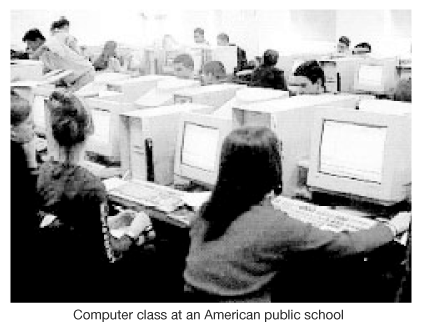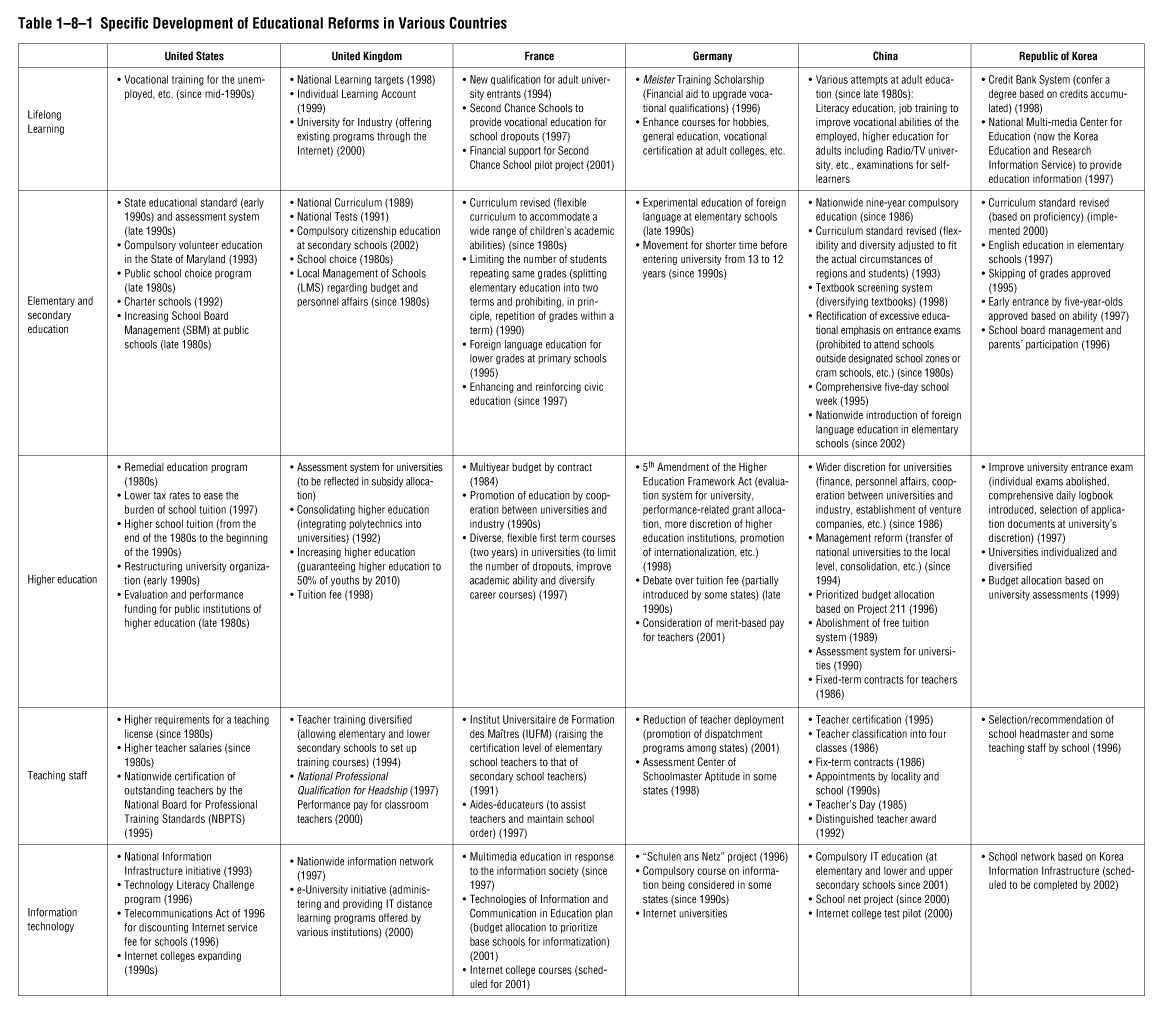| Home > Policy > White Paper, Notice, Announcement > White Paper > Japanese Government Policies in Education, Culture, Sports, Science and Technology 2001 >Chapter8 Section2.4 | ||
As information and telecommunications technology advances rapidly, the global society is becoming increasingly information-oriented. Missing out on this trend would mean falling greatly behind in respect to international competition. Therefore, every country is making informatization policy one of the highest priorities on its agenda, and education informatization is one of the most actively promoted educational policies.
Among the informatization policies of various countries, there are many examples of education informatization policy being established and implemented based on national strategies for the realization of an information society. One such example is Japan, which places educational informatization high on its priority agenda through the "e-Japan strategy" established by the IT Strategy Headquarters. In the U.S., the Clinton Administration's National Information Infrastructure initiative challenged the nation's schools and classrooms to connect to the Internet. Based on this initiative, the Federal Department of Education established a work plan entitled America's Technology Literacy Challenge as well as a fund to provide subsidies for the promotion of informatization to states and communities.
In France, too, the government action plan entitled Governmental Action Program for the Information Society (PAGSI) was announced in 1998. The plan clearly identified an education informatization policy, which was established the previous year by the Ministry of National Education, of installing computers at schools and providing them with Internet access. Germany started the School Networking project in 1996 as a part of the federal government's plan to promote informatization. In the Republic of Korea, the informatization of schools is being promoted under the Korea Information Infrastructure (KII) Development Project, which started in 1996.
In Singapore the national government is actively engaged in informatization and its Ministry of Education established a Master Plan for IT in Education in 1997. Based on this, Singapore started the development of infrastructure for information education. In China, too, informatization policy in the education sector became an urgent priority agendum around 1999 and the government is rushing to spread IT education.
The goals of these countries' active engagement in elementary and lower secondary schools and the present state of the installation of computers and Internet access are as follows.
In the U.S., where the objective was to provide Internet access for every classroom in every school by 2000: Computers have been installed in nearly 100% of schools, 98% of schools have Internet access (2000), 91% of classrooms have computers (1998) and 63% of classrooms have Internet access (1999).
In France, where the target was to introduce computers at every educational institution from the kindergarten to university and to provide Internet access: 35% of elementary schools, 91% of lower secondary schools and 98% of upper secondary schools have Internet access (as of March 2000).
In Germany, where a plan was established to link all elementary and secondary schools on a computer network: 100% of the 35,000 general educational schools have Internet access.
The Republic of Korea has set an objective of completing the networking of schools by 2002, and it has announced that 95% of its elementary and secondary schools were provided with Internet access by January 2001. Singapore and China are both making efforts to spread the use of computers and the Internet. Singapore has set a target of "providing one computer for every two students by 2002," while China is aiming at "networking 90% of elementary and secondary schools within five to ten years from 1999."

|
Mack, who is working at a financial company in Los Angeles, was surprised to learn that his colleague Tom had suddenly been granted a promotion. The reason for this seemed to be that Tom had earned an MBA from Columbia University. When Mack asked Tom how it had been possible for him to obtain a degree from a university in New York without taking a leave of absence, he simply answered that he had taken a one-year online program. Stories like this in the U.S. will be heard in Singapore, Shanghai and Tokyo in the coming days, as there are no national boundaries for the Internet. Even in the U.S., a country with many Internet users, it was not long ago that universities started offering degree programs over the Internet. However, during the last few years, the number of universities offering online programs increased dramatically, with 75% of universities expected to open online courses by the end of 2000 (Newsweek, 24 May 2000). It is not only existing universities that offer online courses; universities like Jones International University (1995) with no campus and which offer courses only through their websites are coming into existence. The situation is not unique to the U.S. In the U.K., universities like the University of Oxford are offering online courses. The British government announced in 2000 that it would establish an "e-University" as a virtual distance education institution, which would combine already existing online courses and distribute them in a comprehensive manner. This is a plan to promote British university education to the world. Other countries are also implementing or planning similar initiatives. In China, the government has given 31 universities, including Beijing University and Qinghua University, approval to offer online courses on a trial basis. It is still premature to determine the judgment of degrees obtained over the Internet. However, this is not to say that competition to develop student markets over the Internet will not happen on a worldwide scale in the near future. In this regard, too, the international level of universities will be tested in the future. |

| Back To Top | MEXT HOME |